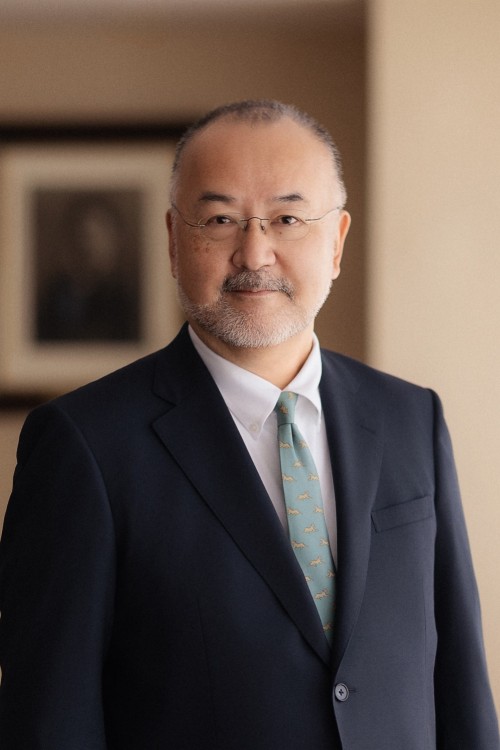
Almost 150 years have passed since Meiji Law School was established under the founding spirit of Rights and Liberty, Independence and Self-Government, and now I am thinking again about the meaning of rights and liberty, and independence and self-government for Meiji University.
Human beings, a.k.a. Homo sapiens , have woven more than 200,000 years of history, in the hope of a better tomorrow. We can say that this wish has been granted to a certain extent in many situations. Homo sapiens means “a wise person” or “a person of wisdom” in Latin, and it is fair to say that we have lived up to our name.
But not all of our wishes came true. Even now, there are many problems on the planet, including environmental destruction, resource depletion, war, oppression, discrimination, and poverty that could even threaten the survival of all of us.
Rather, it can be said that the present problems of human beings, both in quality and quantity, are more serious than problems in the past. What are the common causes of these problems? I think the answer is simple. That would be 1,000 people not respecting the dignity of 1,000 people equally. We need to take care of ourselves, and in the same way, we need to respect others. That is to say, I believe that realizing respect for freedom of self and others on a global scale, or in other words, embodying the ideal of Rights and Liberty, Independence and Self-government is the way to solve these problems.
The founders of Meiji University made this the founding spirit 150 years ago. The history of Meiji University was one that aimed to embody the ideal of Rights and Liberty, Independence and Self-government. And that has yet to be achieved, as I mentioned earlier. Therefore, as a matter of course, Meiji University must continue to move forward with the mission of achieving this goal.
Fortunately, over the past 150 years, Meiji University has grown to 10 schools and 16 departments, with 3,000 faculty, 900 staff, 35,000 students, and 600,000 alumni. We can contribute to the realization of a better tomorrow for human beings through the power of learning that takes advantage of Meiji University’s diversity, synthesis, and scale.
I would like to ask the faculty, staff, students, and alumni of Meiji University for more harmonious cooperation in achieving our mission. I also would like to ask the general public for greater understanding and support for Meiji University as we move forward towards realizing a better tomorrow for human beings.
Human beings, a.k.a. Homo sapiens , have woven more than 200,000 years of history, in the hope of a better tomorrow. We can say that this wish has been granted to a certain extent in many situations. Homo sapiens means “a wise person” or “a person of wisdom” in Latin, and it is fair to say that we have lived up to our name.
But not all of our wishes came true. Even now, there are many problems on the planet, including environmental destruction, resource depletion, war, oppression, discrimination, and poverty that could even threaten the survival of all of us.
Rather, it can be said that the present problems of human beings, both in quality and quantity, are more serious than problems in the past. What are the common causes of these problems? I think the answer is simple. That would be 1,000 people not respecting the dignity of 1,000 people equally. We need to take care of ourselves, and in the same way, we need to respect others. That is to say, I believe that realizing respect for freedom of self and others on a global scale, or in other words, embodying the ideal of Rights and Liberty, Independence and Self-government is the way to solve these problems.
The founders of Meiji University made this the founding spirit 150 years ago. The history of Meiji University was one that aimed to embody the ideal of Rights and Liberty, Independence and Self-government. And that has yet to be achieved, as I mentioned earlier. Therefore, as a matter of course, Meiji University must continue to move forward with the mission of achieving this goal.
Fortunately, over the past 150 years, Meiji University has grown to 10 schools and 16 departments, with 3,000 faculty, 900 staff, 35,000 students, and 600,000 alumni. We can contribute to the realization of a better tomorrow for human beings through the power of learning that takes advantage of Meiji University’s diversity, synthesis, and scale.
I would like to ask the faculty, staff, students, and alumni of Meiji University for more harmonious cooperation in achieving our mission. I also would like to ask the general public for greater understanding and support for Meiji University as we move forward towards realizing a better tomorrow for human beings.
UENO Masao, President
Profile
Name: UENO Masao
(Born in September, 1957)
Brief personal history
1980: Graduated from School of Law, Meiji University
1992: Legal Apprentice
1994~2003: Served as a court judge
2003: Appointed Associate Professor of the School of Law, Meiji University
2010: Appointed Professor of the School of Law, Meiji University
2022: Served as Dean,School of Law, Meiji University
Served as Vice President (Public Relations), Head of Specialist in the President's Office, etc.
Areas of special competence
Criminal law (criminology, offender treatment law, and juvenile law)
Name: UENO Masao
(Born in September, 1957)
Brief personal history
1980: Graduated from School of Law, Meiji University
1992: Legal Apprentice
1994~2003: Served as a court judge
2003: Appointed Associate Professor of the School of Law, Meiji University
2010: Appointed Professor of the School of Law, Meiji University
2022: Served as Dean,School of Law, Meiji University
Served as Vice President (Public Relations), Head of Specialist in the President's Office, etc.
Areas of special competence
Criminal law (criminology, offender treatment law, and juvenile law)


